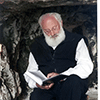The Condition of Entering the Upper World Is Mutual Guarantee
 A question I received: Baal HaSulam writes in his article “The Last Generation” that altruistic deeds will lead to a better society only if they are made “for the sake of the Creator.” Please give an example of an altruistic deed and explain how one must aim his thoughts, or what image one must have in mind, in order for his deeds and intentions to be for the sake of the Creator. Your explanation will be important for work I am doing with a group of children.
A question I received: Baal HaSulam writes in his article “The Last Generation” that altruistic deeds will lead to a better society only if they are made “for the sake of the Creator.” Please give an example of an altruistic deed and explain how one must aim his thoughts, or what image one must have in mind, in order for his deeds and intentions to be for the sake of the Creator. Your explanation will be important for work I am doing with a group of children.
My Answer: In order to really attain the intention of bestowal, of “not for oneself,” to come out of ourselves and have goals that serve others, we need a field in which to work, a place and model that we can use for correcting ourselves. We have to become similar to the Creator even though He is concealed from us. That is to say, the Creator cannot be that model because He is concealed from us. However, He broke the only creation He made, the soul, into many pieces – particular souls. Within each of these parts, He created a perception of self, its “I,” and of others opposite to it. This is our egoism.
When we unite, and when each of us fights his own egoism within, we will then be able to see whether we are attaining spirituality – the quality of mutual bestowal and love. Then we will discover that we cannot attain it and will turn to the Creator. We will discover Him and His readiness to correct our desires, provided that we are mutually responsible for one another and support each other in this regard – and if we turn to him precisely through this force of “Mutual Guarantee.”
Baal HaSulam writes that in our times, this is the necessary condition for entering the Upper World or the quality of bestowal. Hence, all altruistic deeds can only take place inside the group or virtual society, among friends who desire to attain mutual aspiration and support – the mutual guarantee.
Related Material:
Laitman.com Post: How Do You Turn a Bat Into a Rooster?
Baal HaSulam Article: “The Arvut (Mutual Guarantee)”
Baal HaSulam Article: “The Love for the Creator & Love for the Created Beings”
Kabbalah Today Article: From Racial Rifts to Spiritual Harmony
Kabbalah Today Article: Rabbi Hya’s Vision

 Questions I received on family, relationships and
Questions I received on family, relationships and 







